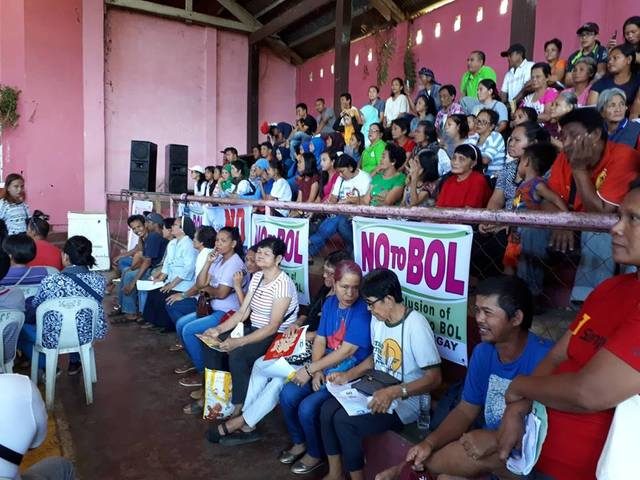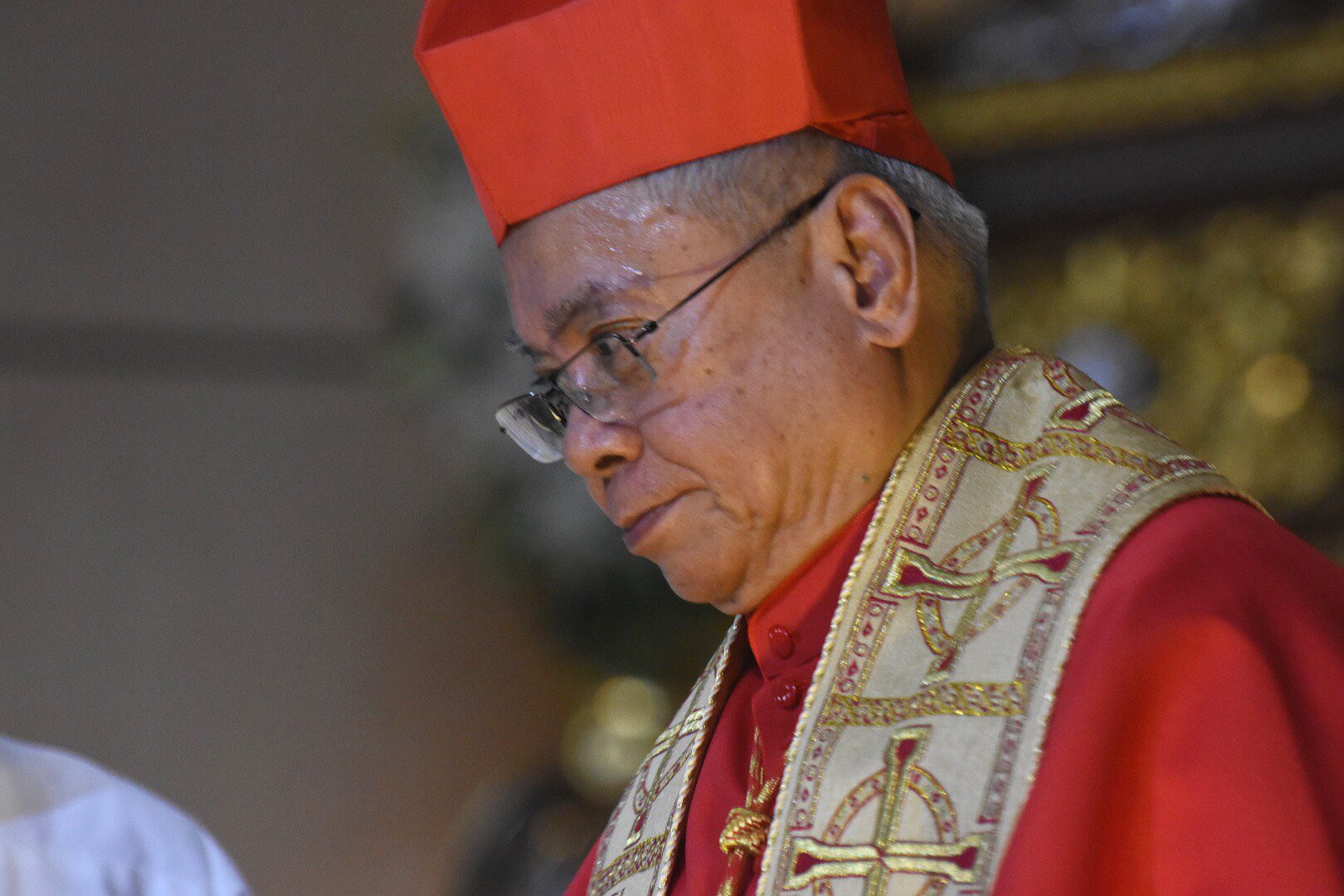SUMMARY
This is AI generated summarization, which may have errors. For context, always refer to the full article.

MANILA, Philippines – One church. Two opposing votes in the historic plebiscite for the new Bangsamoro region in Muslim Mindanao.
Known to vote as one on key national issues, the Catholic Church went separate ways in two key Muslim cities courted to expand the territory of the soon-to-be replaced Autonomous Region in Muslim Mindanao (ARMM).
The local Catholic leadership campaigned for a “yes” vote in Cotabato City, a move that proved pivotal as the city’s popular mayor pushed the “no” side in the last stretch of the campaign prior to the January 21 plebiscite. (READ: How Cotabato City was won)
It was a sweet victory for the supporters of the Bangsamoro Organic Law (BOL), who enjoyed the solid support of Mindanao’s first and only cardinal, retired Cardinal Orlando Quevedo.
The Catholic campaign boosted the Moro Islamic Liberation Front’s (MILF) bid to win the city where it was born.
“I want it to succeed because for me, the BOL significantly and fundamentally addresses the historical injustices against the Bangsamoro since the time of the Spaniards,” Quevedo was quoted as saying on the eve of the vote.
Isabela says no
The opposite happened in Isabela City, where Catholic priests rallied their flock for a “no” vote in and outside the pulpit and openly backed the stand of the ruling Akbar political clan against the BOL.
Isabela City’s “no” vote prevented a total victory for the BOL, as it became the only plebiscite area so far that will not be joining the new autonomous region. (While Sulu province also voted “no,” it becomes automatically included in the new region because it is already part of the current one, the Autonomous Region in Muslim Mindanao, which voted “yes.”)
“Yes” won in Cotabato with 59% of the votes, while “no” won in Isabela with 54% of the votes.
Fear of the law
How did the local churches arrive at different positions? Fear that Christians will be marginalized under the new Bangsamoro region led Isabela priests to a decisive “no” stand.
“The BOL itself is good. However, not all provisions are inclusive. There are ambiguous provisions,” said Father Guillermo Rubillos of the Prelature of Isabela de Basilan. He cited references to “Christian settlers,” which he said looked down on them. (Read the BOL here)
The same fear prompted Cotabato priests to engage the MILF and seek guarantees that the new region will be inclusive to all, including Christians. They all claimed “moral obligation” to guide the flock.
Father Clifford Baira, director of the Social Action Center of the Cotabato City archdiocese, said: “We had our reflection from a very basic question: How are we going to welcome the new political entity? We started with a proactive stand because it was really possible that BOL will be ratified because majority of the Muslim community favored BOL.”
Rubillos said it’s okay for the local churches to differ in opinion. “We have different environments. We have our own campaign because we just stuck to Isabela,” said Rubillos.
Ultimately, the stories of the two cities underscore the challenge ahead for the MILF to prove that no one would be marginalized under the new setup. It concerns not only Christians, but even some camps in the Muslim community.
Akbars vs Hatamans

Mindanao expert Steven Rood, a fellow-in-residence at the Social Weather Stations, attributed results in Isabela mainly to the political strength of the Akbars, prevailing over one of BOL’s biggest campaigners, ARMM Governor Mujiv Hataman.
“Clearly, the Akbars won the political argument and this may be a pointer to city election results in May,” Rood said.
Hataman’s wife, Sitti Djalia Turabin Hataman, is running for city mayor against incumbent Vice Mayor Cherrylyn Akbar, wife of slain Basilan governor Wahab Akbar.
“In our public 2015 survey, Isabela City has a high “undecided” about the BBL (Bangsamoro Basic Law) of 40% so persuasive work by the opponents was possible,” said Rood.
Isabela has a sizeable Catholic population of 34%, based on 2015 government statistics. “In a way, siguro may influence kami. Pero siguro ‘yun din ang pananaw nila. ‘Yun din ang pananaw ng mga bumoto ng ‘no,’” said Rubillos. (In a way, we may have influenced [the vote]. But I think the voters really shared our view.)
Rubillos said his position is based on the belief that the city does not need a new order because Muslims and Christians get along well.
Advocates of BOL claimed “misinformation” poisoned the campaign among Christians, who might still carry a grudge against Muslims due to the history of violent attacks against their priests, including the execution of Father Rhoel Gallardo by the Abu Sayyaf in 2000.
“When I called a meeting, the questions they asked were, ‘Sir, is it true that we can no longer rear pigs under BOL?’ ‘We can’t erect a crucifix anymore?’ These are not true,” said Hataman in an interview in December 2018.
“They only have to look at Lamitan City, which is part of ARMM. There are no restrictions imposed on them (Christians). It’s now even more developed than Isabela City,” Hataman said.
Others attributed the church position to the influence of the Akbars over the local church.
Rubillos defended priests campaigning from the pulpits, a move widely resented by the “yes” campaigners. “That is also our moral obligation to our Catholic people. Hindi naman kandidato ‘yun eh. Hindi naman kandidato na iboto mo si Pedro. ‘Yun siguro ang para sa akin ang hindi tama,” he said. (There were no candidates. We didn’t ask, ‘Vote for Peter.’ I thinks that’s the time it’s wrong)
Practical reasons
Outside the political and church divide, Rood said there were also practical considerations for Isabela to reject the Bangsamoro region just like it rejected ARMM twice in the past.
Unlike Cotabato City, which hosted ARMM regional offices despite it not being a part of the territory, Isabela City practically has no relationship with the autonomous region. Besides, it is geographically closer to Zamboanga than Cotabato.
At the height of the campaign in December last year, when Quevedo arrived in Isabela City along with other high profile advocates of the “yes” vote, Rubillos and other “no” priests distanced themselves from the cardinal.
“He (the cardinal) was invited [by ‘yes’ campaigners] to come here. I didn’t hear him speak. If he actually came here to speak for ‘yes,’ wala po siyang karapatan kasi hindi siya tagadito (he has no right because he’s not from here),” said Rubillos.
Rubillos acknowledged that Quevedo influenced many Christians in Isabela City, too, but he claimed all the priests in the prelature were one in junking BOL.
Cotabato: Quevedo’s ‘prophetic vision’

In Cotabato City, in the wake of the plebiscite results, there are “no” voters who can’t help but envy the vocal church stand in Isabela.
“Cardinal Orlando Quevedo supported the ‘yes’ campaign so no Christian leader took the cudgels for ‘no’ in Cotabato City: The ‘no’ voters relied on Mayor Cynthia Guiani,” said an observer, who refused to be named due to the “sensitivities of residents who are still venting.”
“If the Church in Cotabato had a parallel campaign with the mayor, the results may have been different,” said the observer.
Father Baira said the archdiocese believed long before the campaign even started that there was a great possibility, based on the city demographics, that Cotabato City would vote to join the Bangsamoro region.
The Christian population in Cotabato is not as sizeable as in Isabela, shrinking in recent years to 20% while Muslims make up to 76% of the population.
The local church also viewed BOL from a wider perspective than Isabela, which only looked at the interests of its flock in the city. Quevedo and Cotabato priests looked outward and concerned themselves with protecting the rest of the Christians in ARMM.
With the likelihood of BOL’s ratification in ARMM and Cotabato, it made sense for the archdiocese to focus its efforts in preparing Christians for the new government under the MILF.
As early as July 2018, weeks before President Rodrigo Duterte signed BOL, the archdiocese under Quevedo gathered different dioceses in ARMM and partnered with episcopal and evangelical churches in the region to discuss a plan of action.
A campaign was born to educate Christians about BOL, collect their concerns, and liaison with the MILF to seek guarantees that non-Muslims will not be marginalized under the new setup.
It was only supposed to be an information campaign on BOL. Baira said the “prophetic vision” of Quevedo translated their efforts into an implied campaign for the “yes” vote.
“It is the moral obligation of the church to teach the truth,” said Baira. “If you learn about the positive opportunities provided in the law, you cannot say ‘no’ anymore. You see the positive implications for the Bangsamoro people,” he said.
The church’s ground campaign was focused on ARMM and started late in Cotabato City, where the church walked on eggshells due to the mayor’s stand. While the Christians didn’t go all-out for BOL, Baira said results of the referendum showed “there was a Christian vote for yes” and they contributed to the victory of the referendum.
It was more than enough, said presidential peace adviser Carlito Galvez Jr, to boost the main effort by the MILF, the Sema faction of the Moro National Liberation Front, President Rodrigo Duterte, and his Cabinet.
“The support of Cardinal Orlando Quevedo, the Interfaith Council, and their active campaigning widened the ‘yes’ vote to Christian youth, intellectuals, and professionals,” said Galvez.
The “no” side also pointed to the disenfranchisement of voters, especially among Christians, due to fears caused by explosions in the city. Turnout was low at 54%.
Social healing, BTA representation
In the wake of the divisive plebiscite campaign, Baira said “social healing” is needed in Cotabato City.
“The plebiscite caused a bitter divide in the community. There were renewed fears among Christian communities that they will be marginalized. We need social healing to unite the communities,” said Baira.
The group is holding on to commitments the MILF made in dialogues during the campaign. The group had submitted to the MILF a 17-point peace and development agenda that Baira said, came from meetings among church leaders.
In response, Muslim religious leaders issued a 4-page document declaring the rights and privileges of the non-Muslims under the Bangsamoro.
The church is also seeking representation in the Bangsamoro Transition Authority that will govern the new region until the next regular elections in 2020.
“We are looking forward to the possible participation of the Christian community especially in the process of governance. In the history of Mindanao, the Christian communities always had a role in development. We don’t want the Christians to be left out in the process,” said Baira.
Isabela City, meanwhile, will continue to get regional services from Zamboanga Peninsula.
But Rubillos said the “no” vote doesn’t mean the city is closing its doors to the Bangsamoro region forever.
“Ito lang para sa akin. Kapag may nakita kaming maganda, kami na po ang mag-petisyon na sumali. Hindi na kami kailangan ligawan,” said Rubillos. (This is just me. If we see that something good is happening, we ourselves will petition to join the region. They will not need to woo us.)
Indeed, the new Bangsamoro region has been ratified. But the work ahead is formidable. – Rappler.com
Add a comment
How does this make you feel?
There are no comments yet. Add your comment to start the conversation.